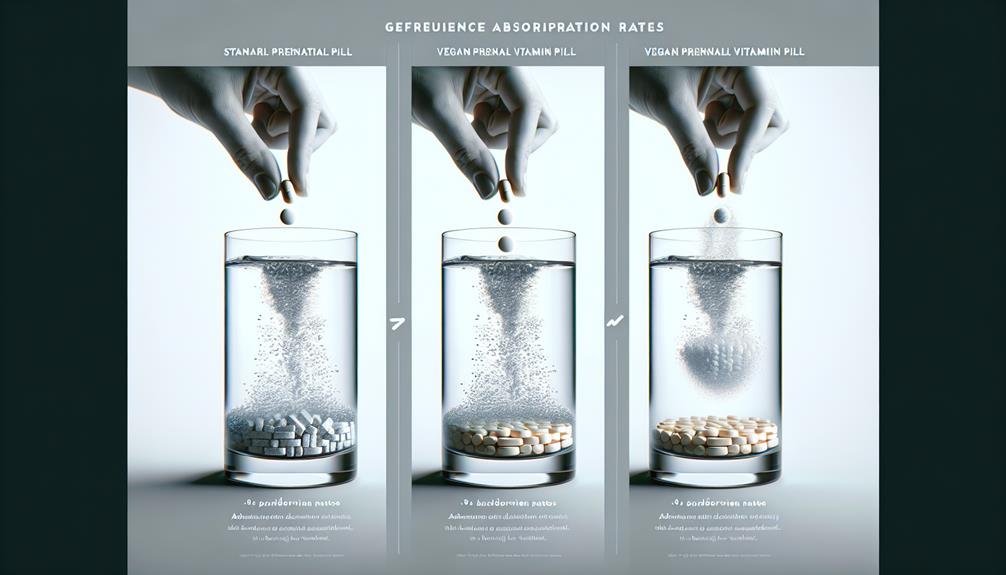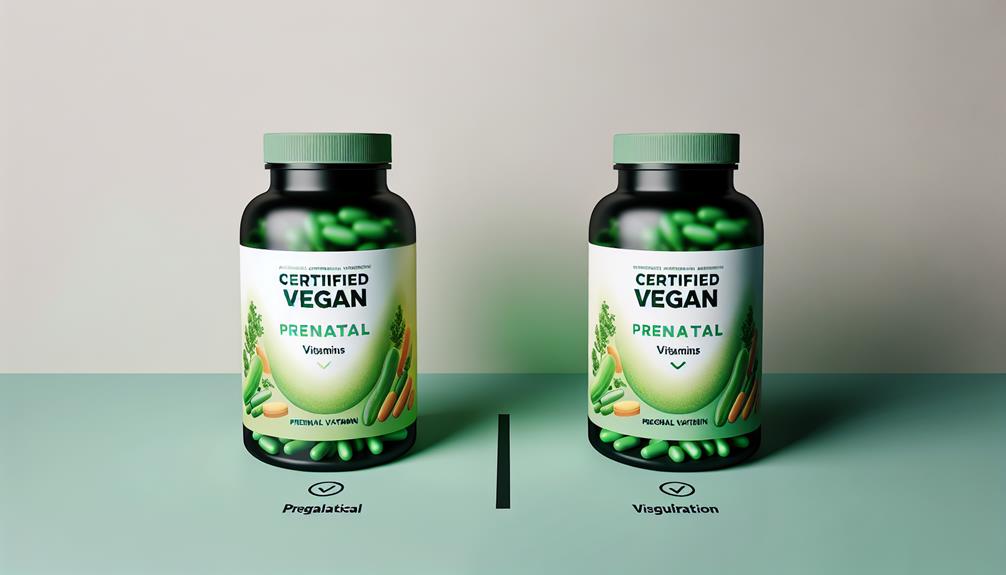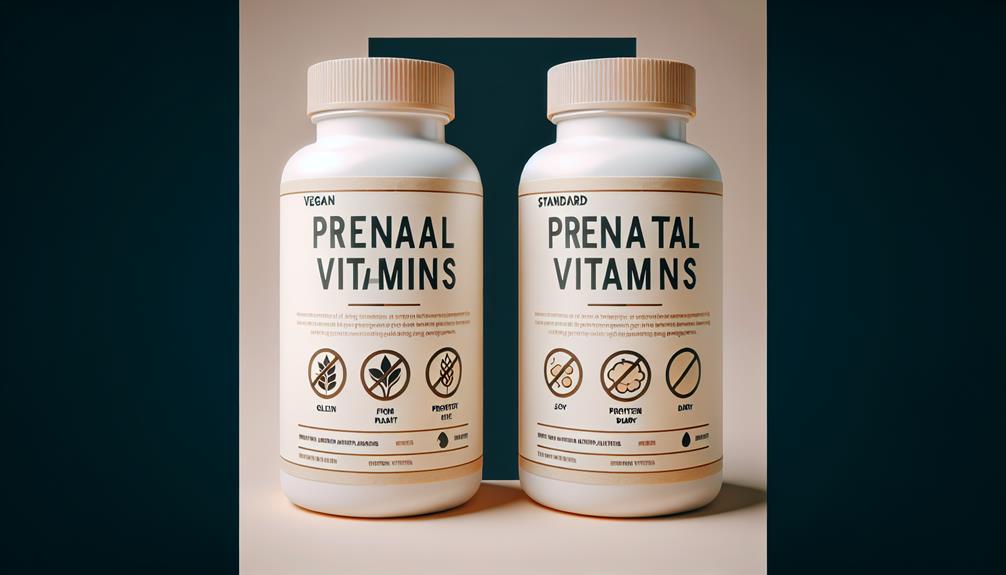







When comparing vegan prenatal vitamins to standard ones, keep in mind that vegan options are tailored for plant-based diets, incorporating essential nutrients like iron and vitamin B12 from plant sources. Vegan versions prioritize ingredients like algae-derived DHA and plant-based iron, while standard prenatal vitamins may contain animal-derived substances. Consider absorption rates too, as plant-based sources can vary. Both types focus on ingredient purity and efficacy. Third-party certifications guarantee quality and ethical practices. Addressing environmental impact and allergen considerations is crucial for each. For a deeper understanding of the nuances, explore the differences in nutritional composition, absorption rates, and certification standards.
Key Takeaways
- Vegan prenatal vitamins use plant-based sources like algae for DHA, iron from plants, and avoid animal-derived ingredients.
- Absorption rates may vary due to plant-based sources in vegan vitamins.
- Vegan prenatal vitamins prioritize purity, avoiding common animal-derived additives found in standard vitamins.
- Certifications ensure quality, with vegan and standard prenatal vitamins undergoing rigorous testing for purity and potency.
- Both types prioritize ethical sourcing, sustainability, allergen considerations, and may offer allergen-free formulations.
Nutritional Composition
When comparing the nutritional composition of vegan and standard prenatal vitamins, you will find differences in the sources and forms of key nutrients. Vegan prenatal vitamins are formulated to meet the unique needs of individuals following plant-based diets, ensuring they receive essential nutrients like iron, calcium, and vitamin B12. While both types of prenatal vitamins contain similar essential vitamins and minerals, the forms and sources may vary.
Nutrient bioavailability is an important factor to take into account when choosing between vegan and standard prenatal vitamins. Some nutrients, such as iron and omega-3 fatty acids, may have different absorption rates depending on their sources and forms. For individuals with dietary restrictions, especially vegans who avoid animal products, ensuring adequate intake of nutrients like vitamin B12 can be challenging. Vegan prenatal vitamins often contain plant-based sources of these nutrients, while standard prenatal vitamins may include animal-derived ingredients. Consulting with a healthcare provider to determine the most suitable option based on individual dietary needs and nutrient bioavailability is necessary.
Ingredient Sourcing
Vegan and standard prenatal vitamins differ in their ingredient sourcing, impacting the origin and quality of key nutrients included in the supplements. When it comes to sourcing ingredients, vegan prenatal vitamins often prioritize sustainability practices and ethical sourcing. Manufacturers of vegan prenatal vitamins tend to focus on using plant-based sources for key nutrients like iron, calcium, and omega-3 fatty acids. These plant-based sources can include algae-derived DHA, calcium from sustainably harvested seaweed, and iron from plant sources like lentils or spinach.
On the other hand, standard prenatal vitamins may derive their nutrients from a wider variety of sources, including animal products. This can raise concerns about ethical sourcing, especially regarding ingredients like fish oil for omega-3 fatty acids or gelatin used in the capsules. While some standard prenatal vitamins may also adhere to ethical and sustainable practices, the emphasis on animal-derived ingredients can sometimes present challenges in ensuring sourcing meets these criteria.
Absorption Rates

To maximize the benefits of prenatal vitamins, understanding the absorption rates of key nutrients is essential for expectant mothers. When comparing vegan and standard prenatal vitamins, one important aspect to take into account is the bioavailability differences. Bioavailability refers to the amount of a nutrient that is absorbed and utilized by the body. Vegan prenatal vitamins may contain plant-based sources of key nutrients like iron and calcium, which could have different absorption rates compared to their counterparts sourced from animal products. Additionally, considering digestive system compatibility is crucial. Some individuals may find that vegan prenatal vitamins are easier on their digestive system due to the absence of certain animal-derived ingredients that could cause gastrointestinal discomfort in some people. Understanding the absorption rates and digestive system compatibility of prenatal vitamins can help expectant mothers make informed decisions about which type of prenatal vitamin is best suited for their individual needs during pregnancy.
Additives and Fillers
Considering the quality of prenatal vitamins, it is important to scrutinize the additives and fillers present in the supplements to guarantee their safety and efficacy for expectant mothers. Vegan prenatal vitamins often prioritize ingredient purity, using plant-based sources and avoiding animal-derived additives commonly found in standard prenatal vitamins. This focus on natural ingredients can appeal to those seeking a cleaner product. However, it is essential to emphasize that both types of prenatal vitamins may contain fillers to help with the manufacturing process or to enhance the stability of the vitamins.
Potential side effects related to additives and fillers in prenatal vitamins can vary. Some individuals may have sensitivities or allergies to certain additives present in standard prenatal vitamins, such as artificial colors, flavors, or preservatives. On the other hand, vegan prenatal vitamins may use plant-based fillers that could also trigger allergies in some individuals. It's advisable for pregnant individuals to carefully read the labels, consult healthcare providers, and consider their own dietary restrictions or sensitivities when choosing between vegan and standard prenatal vitamins.
Certification and Labels

When evaluating prenatal vitamins, it is crucial to pay attention to certification labels that indicate the product has met specific quality and safety standards. Look for third-party verification from organizations like the Non-GMO Project, USDA Organic, or NSF International, which guarantee that the product has undergone rigorous testing for purity and potency. These certifications provide transparency and give you confidence in the quality of the prenatal vitamins you are considering.
Additionally, consider vitamins that emphasize organic sourcing and ethical practices. Organic sourcing indicates that the ingredients were grown without synthetic pesticides or fertilizers, reducing your exposure to potentially harmful chemicals. Ethical practices encompass fair labor standards, sustainable production methods, and cruelty-free testing, aligning with your values as a consumer.
Environmental Impact
Understanding the environmental impact of prenatal vitamins is essential for making informed decisions about the sustainability of your supplement choices. When considering prenatal vitamins, look for brands that prioritize ethical sourcing and sustainability practices. Ethical sourcing involves ensuring that the ingredients used in the vitamins are obtained in a responsible manner that respects both workers and the environment. This can include sourcing ingredients locally to reduce carbon emissions from transportation or choosing suppliers that adhere to fair labor practices.
Sustainability practices in prenatal vitamins can encompass various aspects, such as using recyclable packaging, reducing waste during the manufacturing process, and supporting eco-friendly initiatives. Some brands may also participate in programs that offset their carbon footprint or invest in renewable energy sources to power their operations. By opting for prenatal vitamins from companies that prioritize ethical sourcing and sustainability practices, you can contribute to environmental conservation and support businesses that align with your values.
Allergen Considerations

To make informed choices about prenatal vitamins, evaluating allergen considerations is important in ensuring the safety and suitability of the supplement for your specific dietary needs. Cross contamination risks are a significant consideration when it comes to allergens in prenatal vitamins. Manufacturers may produce different supplements in the same facility, which can lead to unintentional cross-contact with allergens like dairy, gluten, or soy. This poses a potential risk for individuals with allergies or intolerances to these substances.
When selecting prenatal vitamins, it's essential to read labels carefully and look for allergen-free certifications to minimize cross contamination risks. If you have known allergies or sensitivities, consider consulting with a healthcare provider or a registered dietitian to explore alternative options. Some vegan prenatal vitamins are formulated to be free from common allergens, providing a safer choice for individuals with specific dietary restrictions. Always communicate your allergen concerns with your healthcare provider to find the most suitable prenatal vitamin that meets your nutritional needs while addressing any allergen considerations you may have.




